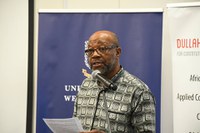Seminar unpacks human rights in South Africa and Argentina
The seminar provided a platform for survivors, members of the judiciary system of both countries and members of the academia to share their experiences and knowledge, seeking common ground between Argentina and South Africa in the search for a more peaceful and fair world through remembering the history lived by both countries. The main purpose of this -and other similar initiatives- was to create the necessary knowledge and consciousness across society to prevent the repetition of such regrettable occurrences.
In South Africa, the Robben Island Prison was an instrument of punishment for freedom fighters and those resisting a cruel and perverse regime seeking to continue racial discrimination and the oppression of the majority of South Africans. In Argentina, the Escuela de Mecánica de la Armada (Mechanic School of the Navy) – ESMA- was one of the most important centres of extermination established by the military dictatorship governing Argentina between 1976 and 1983. Detainees routinely disappeared with their next of kin not knowing their whereabouts. After being subjected to torture, they were usually killed or thrown from planes into the river (Río de Plata).
Both South African and Argentinian societies resisted in various ways the oppression of these regimes. In the Argentinian case, a broad movement for human rights developed in which the status quo was denounced and the relatives of the disappeared played a prominent role in forming organisations such as the Mothers and Grandmothers of Plaza de Mayo. Through peaceful resistance and due to the uproar by Argentinian society, democracy was restored and those responsible for the crimes committed were prosecuted and convicted.
In South Africa, the struggle of a broad-based liberation movement and the leadership of Nelson Mandela managed to defeat the apartheid regime and installed a constitutional democracy. Today, South Africans and Argentinians enjoy living in free societies. However, history teaches that it is essential to remember and to keep the memory of past tragedies alive. The exchanges of experiences, the paths chosen by each country for the reparation and restitution to victims, as well as the strengthening of our respective democracies, contribute to illuminating a path of hope for both countries.

